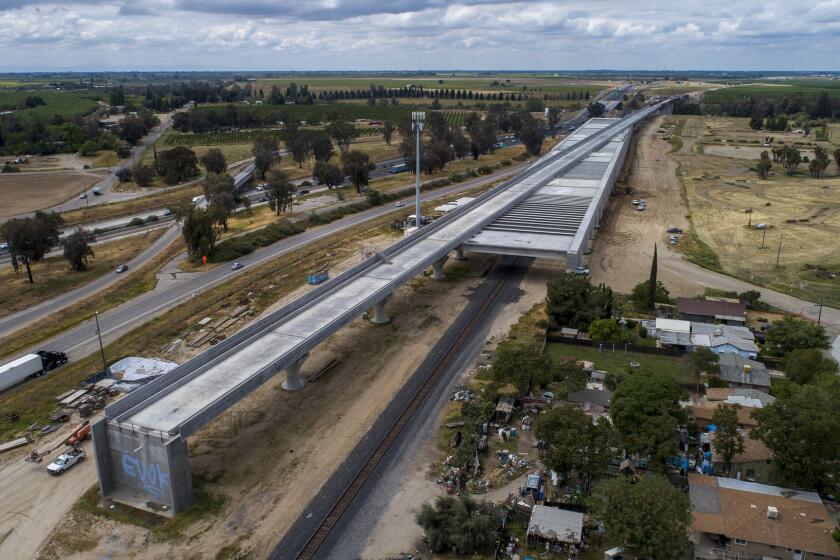Former consultant for California high-speed rail project is cleared of ethics violations

A state ethics investigation into the top consultant working on the California bullet train last year has found he did not violate state law, following allegations that he was among those who approved a contract modification for a company in which he held stock.
The lengthy probe by the Fair Political Practices Commission found that Roy Hill, formerly the top official at the stateâs main consulting firm, WSP, did not violate state laws for conflicts of interest. The commission closed its case, according to a Nov. 3 letter to Hillâs attorney, which has not been previously reported.
In its letter, the commission said the allegations of conflict-of-interest violations âhave been disproven.â
The rail authority declined to comment on the decision. When the probe was launched, it said it took conflict-of-interest concerns seriously and said it would work closely with the commissionâs staff.
A statement issued by his attorney Andreas Rockas said Hill is âpleased that the conflict of interest and self-dealing allegations made against him have been disproven. Mr. Hill looks forward to moving on with his life and career now that his name is cleared.â
WSP Vice President of Communications Corey Dade said: âWe did not receive a copy of the findings because WSP was not a subject in the investigation. We are pleased, but not surprised, that Roy Hill has been cleared of any wrongdoing. Mr. Hill is no longer employed with WSP USA.â
When the probe was started in June 2019, Hill was deputy chief operating officer for the project. He was suspended at the time at the request of the California High-Speed Rail Authority.
The matter involved allegations that Hill signed a $51-million change order for the construction team led by the Spanish firm Dragados. It happened in the same year he may have owned more than $100,000 of stock in Jacobs Engineering, which is part of the Dragados team, records show.
The commission also investigated whether the action may have had a âmaterial financial effectâ on Jacobs and concluded it resulted in a ânominal financial effect.â The agency also said Hillâs stock in Jacobs Engineering was a ânon-interest, so he was not financially interested in the contract.â
Assemblyman Jim Patterson (R-Fresno), a longtime critic of the rail project, requested the investigation after discovering that Hill had listed his stock ownership on a financial disclosure form. âHe got off the hook, because the lawyers found the conflict wasnât big enough,â Patterson said Thursday. âBut there is still a conflict in my mind.â
The change order was signed Dec. 20, 2017, by Hill, along with chief engineer Scott Jarvis and the rail authorityâs then-acting chief executive, Thomas Fellenz. It compensated the Dragados team for delays involving delivery of land, permits, utility relocations and other factors through Aug. 31, 2017.
Hill came onto the project in June 2017. On March 18, 2019, he filed a financial disclosure statement, known as a California Form 700, that showed he held between $100,000 and $1 million worth of stock in Jacobs Engineering, the Texas firm that is providing engineering and design services to the Dragados joint venture. Hill did not fill in sections of the form that indicated when he acquired or may have disposed of the stock.
When California shifted its bullet train plan into high gear in 2008, it had just 10 employees to manage and oversee design of the largest public construction project in state history.
Hill may have acquired the Jacobs shares through a merger, in which Jacobs acquired engineering and environmental management firm CH2M, based in Colorado. Before joining WSP, Hill was a longtime senior executive at CH2M in Europe, where he worked on a broad range of infrastructure projects, according to his resume. It is unclear from his disclosure form whether he owned the Jacobs stock before the merger.
The acquisition was announced Aug. 2, 2017, and completed Dec. 18, 2017. If Hill held CH2M stock, he probably knew he would own the Jacobs shares before he signed the contract modification but did not actually own them until months after he signed the document.
Ethics experts said at the time that such issues are often not black and white. An ethics issue begins if there is a âconflict producing interestâ but requires that the conflict was foreseeable and that it is material or significant, Delaney Marsco, ethics counsel at Campaign Legal Center, a nonpartisan watchdog, said at the time.
More to Read
Sign up for Essential California
The most important California stories and recommendations in your inbox every morning.
You may occasionally receive promotional content from the Los Angeles Times.












